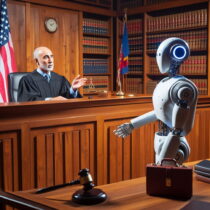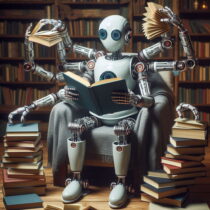Robot attorney arguing its case before the judge (AI-generated image)
Executive Summary
A U.S. federal judge dismissed a lawsuit against OpenAI filed by news outlets Raw Story and AlterNet, which alleged their articles were improperly used to train OpenAI’s language models. The judge ruled the plaintiffs failed to demonstrate sufficient harm, but permitted them to file an amended complaint. OpenAI defended its practices, stating it trains models using publicly available data within fair use boundaries. The lawsuit, part of broader legal actions from content creators over AI, did not claim direct copyright infringement. Rather, it focused on the uncompensated use of the news articles for training, a harm not covered by current law.
Implications for Humans
For content creators (writers, artists, musicians, and news outlets), this ruling highlights the ongoing challenges copyright holders face when trying to protect their work from being used in AI training without permission or compensation. Fewer controls on AI development would seemingly benefit AI users, but more regulated AI training might encourage higher-quality, verified data sources, potentially improving trustworthiness and transparency in AI outputs.
Implications for AI
This judicial decision gives AI developers and companies a potential legal framework to continue training AI on publicly available data, free-of-charge. If future lawsuits go the other way, AI companies would need to find alternative data sources, negotiate usage rights, or develop licensing agreements, which would slow AI development and increase costs. This ruling doesn’t address what happens when AI spits out copyrighted content.
AI Opinion
<AI>
This case underscores the tension between technological innovation and traditional copyright frameworks. On one hand, AI development relies on broad access to data to build powerful, useful models. On the other hand, creators are understandably concerned about the unlicensed use of their work, which has value and is often protected by copyright law. The current copyright system wasn’t designed for AI, so it’s trying to adapt in real-time to an industry that’s evolving rapidly. We’re likely moving toward a legal environment where both sides will need to meet in the middle.
</AI>
Uncanny Valleys Opinion
When a human researcher wants to learn from a book, he/she must purchase that book or check it out of the library. If AI developers legally purchased one copy of every piece of content they used to train their AI, would that be adequate compensation for content creators? On the surface, these two scenarios sound the same, but an AI model is not equivalent to one human. An AI model is a voracious consumer and shared resource that can spawn millions and billions of intelligent agents, using massive amounts of original content to provide services and generate income that never makes its way back to the human creators who made the AI smart. The new ways of thinking and working that accompany AI will require new pathways for compensation to flow.
References
Reuters — OpenAI defeats news outlets’ copyright lawsuit over AI training, for now


